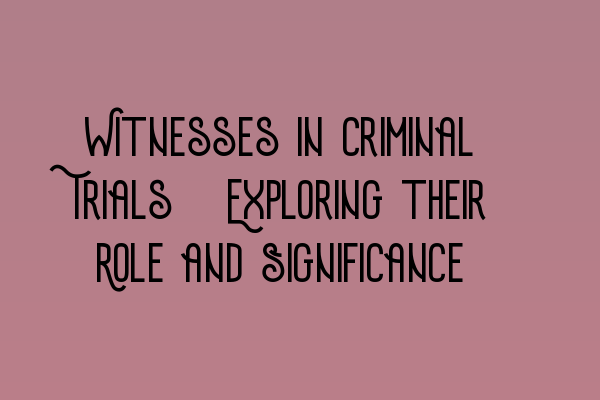Witnesses in Criminal Trials: Exploring their Role and Significance
When it comes to criminal trials, witnesses play a crucial role in the pursuit of justice. Their firsthand accounts and testimonies can provide valuable evidence that helps establish the truth. In this article, we will delve into the role and significance of witnesses in criminal trials, highlighting their importance in the legal process.
The Role of Witnesses
Witnesses are individuals who have observed or have knowledge about the events surrounding the alleged criminal activity. Their role in a trial is to provide factual information regarding what they have seen, heard, or experienced. Witnesses help paint a comprehensive picture of the incident in question, aiding the court in making an informed decision.
Witnesses can be victims, bystanders, law enforcement officials, or experts in specific fields relevant to the case. Each witness brings a unique perspective that contributes to a more complete understanding of the events. Their testimonies are considered primary evidence and can greatly impact the outcome of a trial.
In criminal trials, witnesses are typically called to testify in court under oath. They are examined and cross-examined by the prosecution and defense, respectively. The purpose of cross-examination is to evaluate the credibility and reliability of the witness’s statement, ensuring its accuracy and truthfulness.
The Significance of Witnesses
Witnesses play a vital role in ensuring a fair and just legal process. Their presence provides accountability and transparency, as they bear witness to the events under scrutiny. Without witnesses, establishing the truth would be challenging, if not impossible.
One significant aspect of witness testimony is its ability to corroborate or challenge other pieces of evidence. For example, a witness’s account might align with forensic evidence or contradict the defendant’s alibi. Such corroboration or contradiction strengthens or weakens the overall case presented by the prosecution or defense.
Additionally, witnesses can provide crucial information that may not be available through other means. Eyewitness testimony, for instance, can provide important details about the appearance, actions, and demeanor of the individuals involved in the alleged crime. This information can significantly influence the jury’s perception of the accused.
Moreover, witnesses can offer insights into the motive, intent, or context of the alleged criminal activity. Their testimonies can shed light on the relationships, conflicts, or circumstances that led to the incident. This information aids the court in understanding the underlying factors contributing to the crime.
Conclusion
Witnesses are the backbone of criminal trials, providing valuable information, corroboration, and clarity. Their testimonies shape the narrative of the case and assist the court in determining culpability. Without witnesses, the pursuit of justice would be hindered.
At SQE Criminal Law & Practice Law UK, we understand the significance of witnesses in criminal trials. Our team of expert solicitors ensures that witness testimonies are thoroughly examined, cross-examined, and utilized to build a strong case for our clients. Contact us today for legal representation that leverages the power of witnesses in the pursuit of justice.
Legal Representation for Delaware LLCs in the UK: Expert Advice
SQE Exam Prep: Essential Study Materials for Aspiring Solicitors
Expert Testimonies in UK Courts: Building Strong Cases
Demystifying the Solicitors Qualifying Examination Format
SQE Exam for International Lawyers: Challenges and Success Strategies
